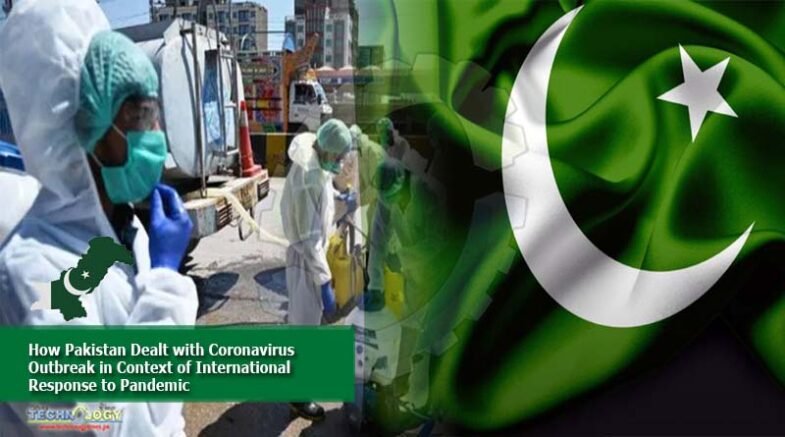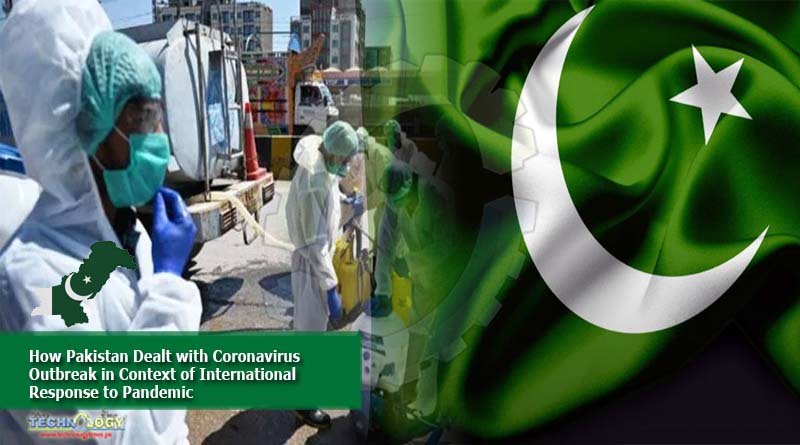According to the latest media reports, the number of coronavirus outbreak cases globally has gone past 25 million, with deaths exceeding 844,000. The total number of coronavirus cases in the United States is nearing six million.

Similarly, New Zealand has made face masks compulsory as it eases coronavirus restrictions in Auckland that were imposed after a sudden spike in cases. It has become very important to explore how Pakistan dealt with the coronavirus outbreak in the context of the international response to the pandemic.
India reported 78,512 new novel coronavirus infections on Monday, just less than 200 compared to the record number of daily cases the country set the previous day. India now has a total of 3.62 million cases, just behind the United States and Brazil. It has the third-highest fatalities at 64,400, according to Johns Hopkins University.
Pakistan, on the other hand, recorded its lowest daily count of coronavirus outbreak cases in more than four months on Sunday with 213 new cases. The curious case of the low number of virus cases in Pakistan has forced medical experts and scientists to carefully scrutinize out the country’s strategy to combat the virus.
Although the role of the National Command and Operations Centre (NCOC) in managing the coronavirus outbreak is commendable, there still needs to be a thorough investigation into how Pakistan contained the spread of COVID-19.
The country reported its first case of the deadly virus on February 26 and went into a three-week lockdown in late March. In the subsequent months, the caseload kept climbing, peaking at 6,825 new cases in a single day on June 13. While it recorded 153 deaths, its highest to date, on June 19.
Similarly, the Punjab government’s efforts to limit the spread of coronavirus are bearing fruit as the province recorded a 99 percent decline in new daily cases on Monday. A spokesperson for the Primary and Secondary Healthcare Department said the total number of COVID-19 cases has increased to 95,447 with the addition of 56 new cases reported over the last 24 hours.
There have been predominantly three myths associated with the coronavirus outbreak in Pakistan. First, it was considered to be a deliberate effort by the western powers to target the world and weaken the emerging economies.
Second, COVID-19 was understood as the wrath of God Almighty, befalling largely on the developed world and their oppressor rulers who had subjected innocent Muslims to persecution and genocide over the last 50 years.
Third, a large number of people completely denied the fact that there could be anything like coronavirus.
Syed Talat Hussain, a prominent Pakistani political commentator, recently wrote an article for Gulf News, and explored the mysterious case of Pakistan and the coronavirus. Hussain noted, “You would also see the people, never fully compliant of the dozens of life-saving guidelines that WHO and local health officials drummed in vain, now not wearing masks or sticking to social distancing at all. Marriage halls have opened up with crazy booking schedules — one had 12 in a day — and schools are slated to resume studies next month”.
He also warned the public to be careful in the next few months. “The reality is that for now COVID-19 is back-page news in Pakistan and the least important concern on the pressing public concern issues. We need another few months to be fully comfortable with the conclusion that this virus has somehow spared the country from the kind of calamity that Italy saw or the US is experiencing,” he said.
Simialrly, Dr. Ahmed Usman, an Associate Professor of Sociology at the Institute of Social and Cultural Studies, University of the Punjab, Lahore, believes that: “Pakistani society is generally considered as a traditional society whose fabric is woven with the threads of norms, values, and cultures that are mostly shaped up by the complex theological underpinnings.”
“Societal norms encourage social gatherings and overwhelming ways to express care, grief, and sorrow. The patterns of greetings are further formed as per religious frameworks that yet again emphasizes kindness, generosity, and warmth ensured through reducing the physical gap between people,” he said.
“Religious rituals including prayers at mosques and religious congregations are considered compulsory in Islam. With this kind of widespread belief system, people believe that while they are in a state of ablution, no disease can harm them,” he added.
Experts are mulling over the question as to what helped Pakistan combat the COVID-19 outbreak. A young population, robust immune systems, and a system of localized “smart” lockdowns have all been touted as reasons for the fall in cases, but health officials admit the actual reasons still remain unclear.
“One ought to have a little humility in this,” Dr Faisal Sultan, an infectious diseases expert who worked as Prime Minister Imran Khan’s adviser for COVID-19, told to the Telegraph that, “There are always great unknowns in science and epidemiology and complex social sciences and interactions. If anyone says they really know a final answer, they are wrong.”
“I think it’s a little bit of many things. Part of it is we are just lucky and the age distribution of the country is such that we were expected to have as many severe cases as you would expect in say the US, or Italy or the UK,” he added.
Volkan Bozkir, the president-elect of the United Nations General Assembly, has endorsed the country’s gains in the fight against the pandemic. Bill Gates, an American business magnate, and philanthropist has also lauded Pakistan’s efforts in the fight against the Covid-19 outbreak in a telephonic conversation with Prime Minister Imran Khan.
Originally published by Global Village Space
